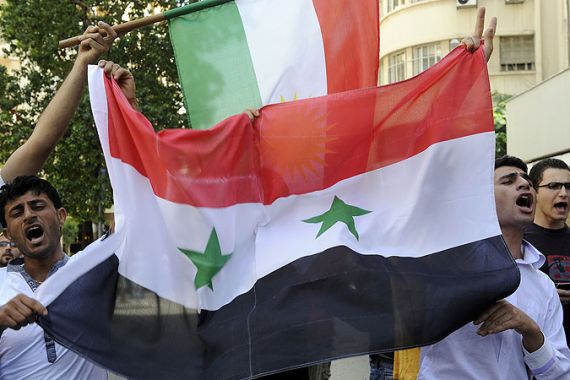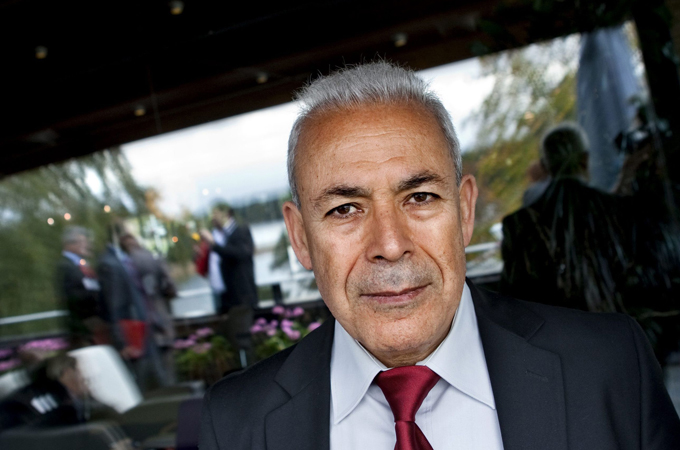Syria’s fragmented opposition
As anti-government forces try to develop a united voice, Al Jazeera looks at the disparate groups within.

 |
| The Syrian National Council attempts to unite Syrian dissident movements across the political spectrum [AFP] |
As protests continue within Syria, there have been proposals among leading members of the opposition to create a united front. However, several months into the uprising, political opposition groups inside and outside of Syria are divided.
The announcement of the formation of the Syrian National Council (SNC) on September 15 and the National Co-ordinating Committee for Democratic Change (NCC) on September 18 marked a new effort to co-ordinate political activity against the government of Bashar al-Assad, the Syrian president.
Meanwhile, military defectors who were formerly divided between the Free Officers Corps and the Free Syrian Army (FSA) have coalesced under one organisational umbrella.
Additionally, while certain youth activists are represented on the SNC and NCC, there are others who continue to feel that these anti-government groups do not represent them. Some accuse those in exiled Western capitals of being out of touch with realities on the ground. Syrian protesters on the street also complain that the best-known internal dissidents spend too much time trying to win favours with diplomats in Damascus.
While those in the opposition are in agreement on the aim of overthrowing the current regime, they have sharp differences on a number of key issues: foreign intervention, the use of violence, and dialogue with the authorities.
Al Jazeera takes a closer look at the opposition factions:
| Syrian National Council (SNC) |
The formation of the Syrian National Council was announced in Istanbul, Turkey. The group has drawn in a number of individuals and parties from across the political spectrum.
 |
| Burhan Ghalioun is the chairman of the SNC [REUTERS] |
Burhan Ghalioun, a prominent French Syrian sociologist, is the acting chairman of the opposition front. He has said the SNC unites “the forces of opposition and the peaceful revolution” and is “open to all Syrians”.
The council’s charter calls for overthrowing the government rather than engaging in dialogue with it, rejects foreign military intervention, and calls for non-violent protests.
Western countries including the US and France have welcomed the SNC, but neither have formally recognised it. Libya’s National Transitional Council (NTC) considers the SNC to be Syria’s legitimate government.
The council is to have 230 seats, 210 to be filled quickly and 20 left for groups that are yet to emerge.
“The Syrian Council is open to all Syrians. It is an independent group personifying the sovereignty of the Syrian people in their struggle for liberty,” Ghalioun said in a meeting in Istanbul on October 2.
About 40 per cent of the members of the SNC are Syrians in exile, having either fled from their homeland when the uprising started in March or are long term exiles.
Not all members of the opposition groups have been listed, and members of the new council are jockeying for positions of power.
The principal groups within the SNC are:
-
Damascus Declaration for Democratic Change is a pro-democracy movement that begun during the so-called Damascus Spring in 2000-2001, which called for democratic change against Assad. The group consists of internal and external opposition groups. They have expressed their support in the uprising “until democratic change is achieved through the destruction of the current regime,” according to a statement in December. They occupy 20 seats on the council.
-
Syria’s Muslim Brotherhood is one of the oldest political movements in opposition to the government. The group has been banned in Syria since the 1980s when they engaged in an armed struggle to overthrow Hafez al-Assad, Bashar’s father.
“The organisation’s leaders have worked outside of Syria for over 20 years, it is hard to accurately assess the current level of support within Syria,” Randa Slim, a research fellow at the New America Foundation and scholar at the Middle East Institute, wrote in Foreign Policy.
-
Local Co-ordinating Committees are grassroots activist groups that have chapters throughout Syria and have been organising the nationwide protests. The majority of these groups are local youth initiatives that organise banners, slogans, and protests. There are 55 members of the Local Co-ordination Committees represented in the SNC.
-
Syrian Revolution General Commission is a coalition of 40 opposition blocs
-
Kurdish groups, tribal leaders and independents
| National Co-ordinating Committee for Democratic Change (NCC) |
The NCC was officially formed in a hotel outside Damascus, where the group elected an 80 member council.
Chaired by Hussein Abdel Azim, the committee includes 13 left-leaning political parties and independent political activists, as well as three Kurdish parties and youth activists.
According to Slim, “The NCC calls for dialogue condition on the withdrawal of the military from the streets, the cessation of the regime attacks against protesters, and the release of political prisoners.”
Similar to the SNC, the NCC also opposes foreign military intervention, preferring economic sanctions in Syria to diplomatic pressure.
| Free Syrian Army (FSA) |
The Free Syrian Army is an armed opposition group that is headquartered on the Turkish-Syria border. The army is made up of military defectors who want to wage an insurgency against Assad’s government.
| Turkey ‘sheltering Syrian fighters’ |
“We will fight the regime until it falls and build a new period of stability and safety in Syria,” the FSA’s leader Colonel Riad al-As’aad told the New York Times.
Turkey is harbouring 50 to 60 leaders of the Free Syrian Army, in a heavily guarded refugee camp although Turkish officials told the New York Timesthat their relationship with the “officers of the camp is purely humanitarian.”
SNC chairman Ghalioun told Al Jazeera that the FSA is a force that could not be discounted. Yet it should limit its operations to defending unarmed civilians, he said.
The strength of the FSA is unknown. While the group itself has said its membership is between 10,000 to 15,000, members of the SNC told Al Jazeera that this number is “exaggerated”.
Andrew Tabler, a fellow at the Washington Institute for Near East Policy, told the New York Times that the formation of the army highlights the question of whether the opposition would continue to protest non-violently, as it has through much of the uprising or would it “go down another path to fighting back”.
| Youth groups |
The youth activists are men and women who come from different socio-economic and professional backgrounds. Many are non-ideological, but are eager for change.
At the outset of the uprising, activists organised themselves into small local communities. But they have evolved into a web of coalition over the months. The three prominent coalitions are “the Syrian Revolution General Commission (SRGC), the Ghad alliance, and the Higher Council of the Syrian Revolution,” Slim told Al Jazeera.
Slim added that all three groups oppose the NCC’s call for dialogue with the regime.